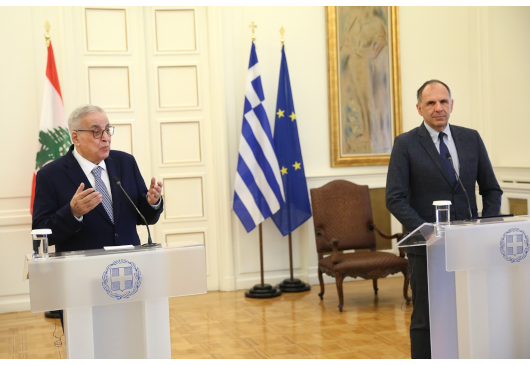 G. GERAPETRITIS: It is an honor and pleasure to welcome the Minister of Foreign Affairs of Lebanon today.
G. GERAPETRITIS: It is an honor and pleasure to welcome the Minister of Foreign Affairs of Lebanon today.
Minister, dear Abdallah,when we met last September in New York, on the sidelines of the United Nations General Assembly, the situation was totally different.
Today, we are appalled by the war in Gaza and the tragic humanitarian disaster that calls us to confront our responsibilities.
We have to do everything possible to immediately halt hostilities and prevent the crisis spill-over effect, regional conflagration, and the war’s destabilizing effects, primarily on a humanitarian level but also on the global economy due to tensions in the Red Sea and insecurity in international shipping.
Regarding the tragedy unfolding in Gaza, Greece maintains an unwavering stance based on principles.
Humanitarian aid should be reinforced and channeled through sustainable routes that allow for its unhindered flow with medical and healthcare supplies and restore essential infrastructure, such as water and electricity networks.
At the same time, ensuring the safety of humanitarian aid workers, people who risk their lives daily for a higher moral cause is equally important.
The attacks we all witnessed against missions of humanitarian organizations were indeed beyond belief.
We do everything possible to achieve a sustainable solution. This sustainable solution can only come with the resolution of the Palestinian Issue within the framework of the resolutions of the United Nations Security Council on the two-state solution.
Dear Minister,
Greece has historically placed particular importance on the sovereignty and stability of Lebanon.
In this regard, we endorse every international effort to strengthen Lebanon and the stability and prosperity of the people of Lebanon.
We demonstrate this in practice, with the emphasis we place on our participation in UNIFIL, the United Nations peacekeeping mission, and supporting every initiative aimed at de-escalation on the southern border of Lebanon with Israel.
Greece's position is that peace must be achieved immediately in the region and that Security Council Resolution 1701 must be fully implemented.
We recognize the disproportionate burden that Lebanon has assumed on the migration issue in relation to its size and population mainly concerning refugees from Syria.
At the same time, we make every effort to effectively control and address the illegal trafficking networks that exploit humans, degrade human dignity and create truly inhumane conditions for migrants.
Dear Minister,
Greece is at the disposal of the friendly country of Lebanon to promote understanding within the EU and international fora.
On this occasion, I would like to express our particular satisfaction with the cooperation between Greece and Lebanon within regional and international organizations, as well as with the exceptionally constructive trilateral cooperation between Greece, Cyprus, and Lebanon.
Before I conclude, I would like to briefly refer to the many aspects of our bilateral relationship and cooperation.
Cooperation that extends to sectors such as education, with the emblematic example of the Greek language learning program and support for theological studies at the "Saint John of Damascus" Institute of Theology at the University of Balamand in Lebanon, as well as the fields of economy, trade, and energy.
Dear Minister,
I would like you always to consider Greece a friendly country. We will continue constructively and substantively engaging in addressing the big challenges in the Middle East.
I warmly thank you for your presence.
JOURNALIST: A question for you, Minister. You have repeatedly said in the past that it is an advantage that Greece can discuss with all stakeholders in the Middle East. I would like to ask whether we maintain communication channels with Israel. And whether in the future, the next day after the war, the stance of the Israeli government in this war could potentially disrupt its strategic relationship with Greece. Thank you.
G. GERAPETRITIS: It is true that Greece communicates and engages in political dialogue with all parties and all stakeholders in the Middle East, as well as in the broader Gulf region and North Africa.
This enables us to offer our good offices concerning the two major issues in the Middle East, namely the provision of necessary humanitarian aid to alleviate the major humanitarian crisis we are currently facing, and at the same time to be part of a meaningful discussion about the day after in the Palestinian issue.
We are, indeed, in contact with the Israeli side, with which, as you are aware, Greece maintains a strategic relationship. We have the opportunity to receive regular updates on the situation.
What I want to emphasize is that Greece, being aware of the current situation and the fact that there are still Israeli hostages being held in conditions that are unacceptable and contrary to every notion of International Law, should underline that what we are seeking is an immediate cessation of hostilities, so that peace can be given a real, substantial chance.
We look forward to both today and the future of our relations with Israel and the friendly countries of the Middle East and the broader region.
Greece will always remain committed to its principled foreign policy. We stand by International Law. We are opposed to any form of revisionism, and will continue to strive for the consolidation of peace and prosperity for all peoples.
Thank you very much.
April 9, 2024


